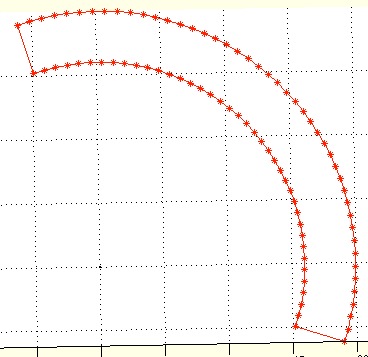PLtubbing
by Tim C. Lueth, SG-Lib Toolbox: SolidGeometry 5.6 - PL/Point Lists
Introduced first in SolidGeometry 1.1, Creation date: 2013-12-25, Last change: 2025-09-14
returns a points list for a 2D tubbing
See Also: , PLcircle
, PLcircseg
, PLevolvente
, PLgearDIN
, PLkidney
, PLrand
, PLspiral
, PLsquare
, PLstar
Example Illustration

Syntax
[PL,EL]=PLtubbing(RI,RA,[n,phiA,phiB])
Input Parameter
RI: | | Inner radius |
RA: | | Outer radius |
n: | | optionl n |
phiA: | | starting angle |
phiB: | | ending angle |
Output Parameter
PL: | | Point list |
EL: | | Edge list |
Copyright 2013-2025 Tim C. Lueth. All rights reserved. The code is the property of Tim C. Lueth and may not be redistributed or modified without explicit written permission. This software may be used free of charge for academic research and teaching purposes only. Commercial use, redistribution, modification, or reverse engineering is strictly prohibited. Access to source code is restricted and granted only under specific agreements. For licensing inquiries or commercial use, please contact: Tim C. Lueth
Algorithm (Workflow)
This function, PLtubbing, generates a 2D tubbing shape defined by inner and outer radii, and specified angles. It returns a list of points and edges that define the shape.
Input Parameters
- RI: Inner radius of the tubbing.
- RA: Outer radius of the tubbing.
- n (optional): Number of segments for the circular arcs. If not provided, it defaults to a function of the outer radius.
- phiA: Starting angle of the arc in radians. Defaults to 0 if not provided.
- phiB: Ending angle of the arc in radians. Defaults to Ã/2 if not provided.
Output Results
- PL: A list of points that define the closed polygon of the tubbing.
- EL: A list of edges that connect the points in
PL.
Algorithm Steps
- Determine the number of segments
n for the circular arcs. If n is provided in varargin, use it; otherwise, calculate it based on RA.
- Set the starting angle
phiA. If provided in varargin, use it; otherwise, default to 0.
- Set the ending angle
phiB. If provided in varargin, use it; otherwise, default to Ã/2.
- Generate the outer arc points
PL1 using the function PLcircseg with parameters (RA, n, phiA, phiB).
- Generate the inner arc points
PL2 using the function PLcircseg with parameters (RI, n, phiA, phiB).
- Concatenate
PL1 and the flipped version of PL2 to form the complete point list PL.
- Generate the edge list
EL using the function ELofCVL with PL as input.
- If no output arguments are specified, plot the shape using
SGfigure and CPLplot.
Algorithm explaination created using ChatGPT on 2025-08-19 00:59. (Please note: No guarantee for the correctness of this explanation)
Last html export of this page out of FM database by TL: 2025-09-21